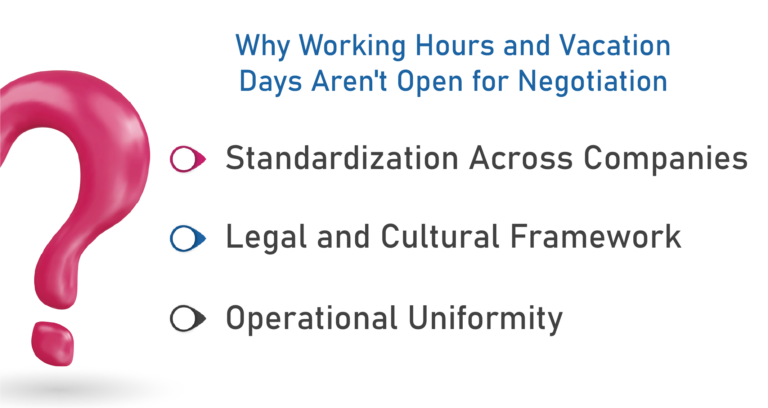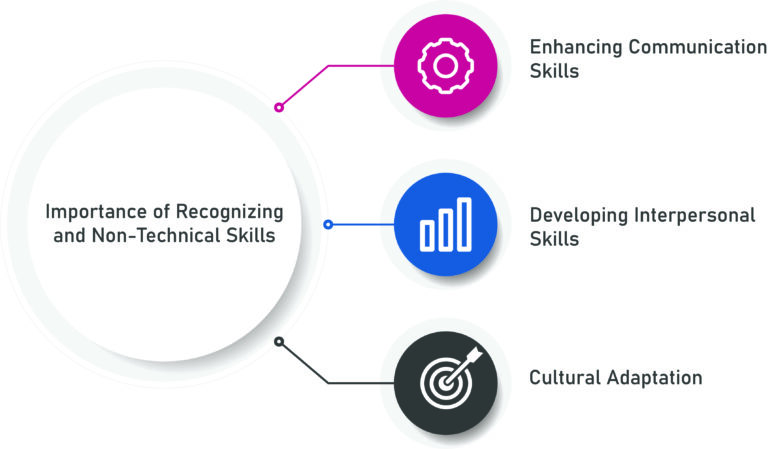How to negotiate salary in Germany: A Comprehensive Guide for International Candidates
In today’s globalized world, the German job market stands as a beacon of opportunity for international talent. Germany has become a top destination for professionals seeking growth and stability because of its robust economy, cutting-edge industries, and commitment to work-life balance.
However, venturing into this market requires more than just skill and ambition; it necessitates a nuanced understanding of how to negotiate salary in Germany—a pivotal factor in securing a contract that meets financial expectations and aligns with career aspirations.
From understanding the importance of how to negotiate salary offers in Germany to recognizing non-negotiable aspects of a job offer, this article aims to shed light on key strategies that can empower candidates to negotiate Deutsch confidently and effectively.
Salary Negotiation Germany – Understanding Salary Range and Its Importance
Negotiating salary in Germany can be nuanced, especially for internationally recruited candidates.
One key strategy that stands out in this context is the concept of offering a salary range rather than a fixed amount.
This approach not only reflects a deep understanding of how to negotiate salary in Germany but also aligns with the expectations and practices within the German job market.
The Concept of Providing a Salary Range
- Flexibility Over Fixation: Offering a salary range as opposed to a single, fixed amount shows flexibility. It communicates to potential employers that the candidate is open to discussion and adaptable, qualities highly valued in the professional world.
- Accommodating Budget Constraints: Employers often have a predetermined budget for positions. By presenting a range, candidates can align their expectations with the company’s budgetary limitations, making it more likely for them to fit into the allocated salary bracket.
- Reflecting Self-Evaluation: A range indicates that the candidate has a clear understanding of their worth in the job market. It reflects their self-assessment based on skills, experience, and industry standards.
Examples Illustrating Flexibility and Negotiation Success
- Scenario 1: Aligning with Budget Limits: Consider a candidate who states their salary expectation as a range of €60,000 to €70,000. This range strategy proved beneficial when the employer’s maximum budget was €65,000. The candidate, initially hoping for €70,000, successfully secured the job at €65,000, a figure that both satisfied their expectation and stayed within the employer’s budget.
- Scenario 2: Adjusting to Performance: Another instance involves a candidate who offered a range based on their performance evaluation during the recruitment process. By stating a range of €55,000 to €65,000, they opened the door for the employer to offer €60,000 – a middle ground that recognized the candidate’s potential while allowing room for future salary growth based on performance.
In both scenarios, the use of a salary range facilitated a successful salary negotiation outcome in Germany. It demonstrated the candidates’ understanding of the market and their flexibility, which are crucial in navigating the complex landscape of salary negotiation Germany, particularly in an international context like Germany.
This approach not only benefits the candidate but also fosters a positive start to the employer-employee relationship, built on mutual understanding and respect.

Non-Negotiable Elements: Working Hours and Vacation Days
When it comes to salary negotiation in Germany for internationally recruited candidates in Germany, it’s essential to recognize that not all elements of a job offer are flexible. Particularly, working hours and vacation days often stand as non-negotiable elements.
Understanding why these aspects are typically set in stone and distinguishing between what can and cannot be negotiated are crucial for a successful salary negotiation in Germany.
Why Working Hours and Vacation Days Aren’t Open for Negotiation
- Standardization Across Companies: In Germany, working hours and vacation days are generally standardized across companies. This standardization ensures fairness and consistency among employees, making these elements less likely to be subjects of individual negotiation.
- Legal and Cultural Framework: German labor laws and cultural norms play a significant role in defining work hours and vacation entitlements. Companies adhere to these laws and norms strictly, leaving little room for deviation in individual contracts.
- Operational Uniformity: Companies often seek operational uniformity and ease of management. Having employees on varying schedules or vacation plans can disrupt workflow and team dynamics, making it challenging to manage projects and deadlines.

Negotiable Aspects: Education, Bonus, and Non-Monetary Benefits
Internationally recruited candidates can negotiate aspects like education, bonus, and non-monetary benefits in Germany.
These elements, unlike more rigid factors like working hours and vacation days, offer room for negotiation and can significantly enhance the overall compensation package.
- Education and Training: Educational opportunities, such as certifications and training, can often be negotiated. However, it’s important to be aware that these are additional costs for the employer. If you push for these benefits, it might impact your salary offer, as the overall compensation package is usually balanced.
- Bonus Payments: The variability of salary through bonus payments is more common in roles like sales, where performance can be directly quantified. For most development jobs, this isn’t standard practice, as it’s challenging to measure output in a way that ties directly to bonus structures.
Strategies for Balancing Salary Expectations with Additional Perks
- Understanding the Trade-offs: When negotiating for educational benefits or bonus structures, be mindful of how these requests might affect your base salary. It’s a balance between immediate monetary compensation and long-term career development opportunities.
- Leveraging Non-Monetary Benefits: In some cases, non-monetary benefits like support for German language classes or assistance with relocation (like finding a flat or covering travel costs) can be negotiated.
These benefits, while not directly adding to your salary, can significantly reduce your living expenses and enhance your overall experience in Germany. However, it’s crucial to recognize that these benefits are often seen as part of your total compensation and may be factored into your salary discussions.
Distinction Between Negotiable and Non-Negotiable Aspects
- Negotiable Elements: Salary, bonus structures, additional benefits like education allowances, relocation assistance, and sometimes flexible working conditions (like remote work options) are typically open for salary negotiation Germany. These elements are often tailored to the individual’s role, skills, and the value they bring to the company.
- Non-Negotiable Elements: On the other hand, working hours and vacation days are usually non-negotiable due to the aforementioned reasons. These aspects are often clearly outlined in company policies and are consistent across all employees, regardless of their position or seniority.
Understanding this distinction is vital for candidates, especially those from different cultural backgrounds where such elements might be more flexible.
Recognizing the non-negotiable aspects allows candidates to focus their negotiation efforts on areas where there is room for discussion, thereby increasing the chances of a successful outcome.
It also helps set realistic expectations and build a relationship with the employer based on mutual respect and understanding of the local work culture.

Relocation Assistance and Its Implications
Negotiating for relocation assistance, such as help with finding a flat or covering flight tickets, is a common consideration for internationally recruited candidates in Germany.
However, understanding how to approach this and its impact on the overall compensation package is crucial.
Insights into Negotiating for Relocation Help
- Flat and Accommodation Assistance: Some German employers may offer assistance in finding accommodation, especially in cities where it’s challenging to find housing. This help doesn’t typically mean covering the cost of the flat but rather facilitating the process of securing accommodation.
- Flight Tickets and Relocation Help: Candidates often inquire about flight ticket coverage or broader relocation assistance. It’s important to note that employers don’t generally see a benefit in paying extra for candidates coming from afar, as this presents additional risks and complexities. Therefore, insisting on these can sometimes be counterproductive.
Impact of Asking for Relocation Assistance on Salary
- Balancing Costs: When employers consider the total costs of hiring an employee, relocation assistance factors into this calculation. If an employer agrees to cover certain relocation expenses, they might balance this by adjusting other parts of the compensation package, including the salary.
- Risk of Over-Negotiation: Candidates should be cautious about pushing too hard for extensive relocation assistance. Demanding high salaries while also insisting on significant relocation support can create a negative impression and may lead employers to favor local or EU candidates, who don’t require such additional investments.
- Cultural Misinterpretation: There’s a common misconception among some candidates that high-caliber jobs will automatically include generous relocation packages. However, in the German context, this is not a standard expectation and insisting on it might lead to misunderstandings about the candidate’s awareness of local practices and financial expectations.

Understanding Cultural Differences: Navigating Salary Negotiation Germany
Cultural perceptions significantly influence the approach and outcome of salary negotiation in Germany, particularly in a diverse and structured environment like Germany. Understanding these cultural nuances is essential for internationally recruited candidates.
How Cultural Perceptions of Negotiation Vary and Affect the Process in Germany
- German Discomfort with Negotiation: Unlike some cultures where negotiation is almost a sport, Germans generally do not relish the negotiation process. They tend to find it uncomfortable, preferring straightforwardness and transparency.
- Expectation of Realistic Pricing: In Germany, there’s an expectation that any quoted price, including salary expectations, should be realistic and final. Changing the price during negotiations can be seen as unprofessional or unreliable, potentially harming one’s reputation.
Importance of Being Realistic and Prepared in Salary Discussions
- Research and Realism: Proper preparation involves researching industry standards and aligning your salary expectations accordingly. This approach is seen as professional in Germany, where being realistic is valued over ambitious but unrealistic demands.
- Consistency in Pricing: Once a salary range or expectation is set, it’s important to maintain consistency throughout the negotiation process. Significant changes in salary demands can lead to a loss of trust and credibility with potential employers.
- Understanding the Employer’s Perspective: Recognizing that hiring from abroad carries additional risks and costs for German employers is crucial. Candidates should be empathetic to these challenges and avoid making excessive demands that could further burden the employer.

Negotiation Strategies for Different Company Sizes
The size and nature of a company in Germany can significantly influence the negotiation process, especially for internationally recruited candidates.
Understanding the differences in negotiation tactics between small companies or startups and established companies is crucial for a successful salary negotiation Germany.
Differences in Negotiation Tactics for Small Companies/Startups vs. Established Companies
- Flexibility in Small Companies and Startups: Small companies and startups often have more negotiation flexibility than larger, established companies. They may not have rigid salary scales or standardized benefits, allowing for more personalized negotiation.
- Standardization in Established Companies: Larger, established companies typically have more structured and standardized processes for salary and benefits. These companies often have set budgets and scales for different positions, which limits the scope of negotiation.
Tips for Creative Negotiation with Smaller Employers
- Leverage Non-Monetary Benefits: In smaller companies, you might negotiate Deutsch for benefits that don’t directly impact salary but offer value, such as flexible working hours, opportunities for professional development, or titles that enhance your professional profile.
- Consider Equity Options: Startups might offer equity or stock options as part of the compensation package. While you may wondering why are salaries in Germany so low, it can potentially lead to significant gains if the company succeeds.
- Tailored Benefits: Smaller companies might be open to providing benefits tailored to your specific needs, such as attending international conferences, which can be both professionally rewarding and personally fulfilling.
- Performance-Related Pay: In some cases, especially in roles critical to the company’s success, negotiating performance-related pay can be an effective strategy. This aligns your compensation with the company’s growth and success, potentially leading to higher earnings than a fixed salary might offer.
In summary, understanding the company’s size and structure can guide your negotiation strategy. In smaller companies, there’s room for creativity and personalized benefits, while larger companies require a more standardized approach, focusing on fitting within existing salary scales and benefit packages.
Growing Through Performance: A Strategic Approach
Focusing on growth opportunities and performance criteria during salary negotiation in Germany can be a strategic approach, especially for candidates looking to establish a long-term career in Germany.
This method not only emphasizes the candidate’s dedication to personal and professional development but also aligns their goals with the company’s objectives, creating a mutually beneficial relationship.
Focusing on Growth Opportunities and Performance Criteria
- Performance-Based Opportunities: Instead of fixating solely on the initial salary number, candidates can negotiate Deutsch based on performance benchmarks. This approach involves discussing potential salary increases in Germany or promotions contingent on achieving specific performance goals.
- Emphasizing Skill Development: Candidates can express interest in opportunities for skill development, such as training programs or attending industry conferences. This shows a commitment to growing in line with the company’s needs and can be more appealing to employers than a straightforward salary increase in Germany.
Aligning Personal Growth with Company Objectives
- Mutual Benefits: By linking personal growth plans with the company’s goals, candidates demonstrate their potential long-term value to the organization. This can be more persuasive than negotiating solely for immediate financial gains.
- Career Path Discussions: Engage in discussions about potential career paths within the company. Understanding and negotiating salary in Germany for a clear progression plan can be more beneficial in the long run than a higher starting salary.
- Performance Evaluation Criteria: Clarify and negotiate the criteria for performance evaluations. Understanding what the company values and how performance is measured can help candidates focus their efforts in areas that are most likely to be recognized and rewarded.
Adopting a strategy that emphasizes growth and performance not only helps in achieving a fair salary but also fosters a more engaged and productive relationship with the employer. It shows a willingness to invest in the company’s future, a trait highly valued in the professional environment.

Identifying and Addressing Blind Spots
In salary negotiations and career development, particularly for internationally recruited candidates in Germany, recognizing and improving non-technical skills is crucial.
These skills, often referred to as soft skills, play a significant role in professional success and can be a determining factor in salary negotiation Germany and career progression.
The Importance of Recognizing and Improving Non-Technical Skills
- Enhancing Communication Skills: Non-technical skills, such as communication abilities, can be as important as technical proficiency. The ability to effectively articulate ideas, listen, and engage in meaningful dialogues with colleagues and superiors is vital.
- Developing Interpersonal Skills: Skills like teamwork, adaptability, and emotional intelligence are essential in the workplace. They facilitate better collaboration and can significantly impact one’s ability to fit into and contribute to a team.
- Cultural Adaptation: For international candidates, understanding and adapting to the cultural nuances of the workplace in Germany is a non-technical skill that can greatly influence career success.
Real-Life Examples Illustrating the Consequences of Ignoring These Skills
Example 1:
- Communication Breakdown: A candidate with excellent technical skills but poor communication abilities might struggle to explain their ideas or understand project requirements, leading to misunderstandings and errors in their work. This can hinder their ability to secure promotions or salary increase in Germany, as their overall effectiveness is compromised.
Example 2:
- Inability to Adapt Culturally: An international candidate who fails to adapt to the German work culture may find it challenging to collaborate with local teams. This lack of cultural adaptability could lead to isolation and a diminished reputation within the organization, affecting career growth and salary potential.
Example 3:
- Lack of Teamwork: A highly skilled individual who cannot work well in a team setting may find it difficult to be part of collaborative projects. This inability to integrate into teams can limit opportunities for complex, high-impact projects that often lead to career advancement and salary hike in Germany.
Addressing these blind spots by actively working to improve non-technical skills can open up numerous opportunities for career growth and successful salary negotiations in Germany.
It demonstrates to employers a well-rounded professional capable of thriving in various aspects of the job.

Credibility and Consistency in Negotiation
Maintaining credibility and consistency in salary negotiations in Germany is pivotal, particularly in the context of the German job market. This approach not only facilitates a smoother negotiation process but also establishes a foundation of trust between the candidate and the employer.
The Significance of Maintaining Credibility and Consistency
- Building Trust: Consistency in salary demands and negotiation stance helps in building trust with potential employers. It shows that the candidate is serious and has a clear understanding of their worth and the market standards.
- Avoiding Misunderstandings: Changing salary demands or negotiation terms frequently can lead to misunderstandings and may cause employers to question the candidate’s reliability and professional seriousness.
Examples Demonstrating the Pitfalls of Losing Credibility
- Overestimating Value: A candidate who initially quotes a reasonable salary based on their skills and experience, but later drastically increases their demand after a successful interview or test, can lose credibility. This shift might lead the employer to question the candidate’s integrity and whether they are truly a good fit for the company.
- Inconsistency in Demands: A situation where a candidate continually changes salary requirements or other job conditions can be off-putting to employers. It can create an impression of indecisiveness or a lack of understanding of the job market, ultimately weakening the candidate’s salary negotiating position.
- Cultural Missteps: For international candidates, not understanding the cultural norms around salary negotiation in Germany can lead to mistakes. For example, aggressively bargaining over salary or benefits, common in some cultures, might be perceived negatively in Germany, where straightforwardness and transparency are valued.
Balancing Confidence with Humility and Fairness
- Projecting Realistic Confidence: It’s important to balance self-assurance with humility. Candidates should confidently express their qualifications and expectations but also show flexibility and understanding of the employer’s perspective.
- Demonstrating Fairness: Fairness in negotiation involves understanding and acknowledging the employer’s constraints, including budget limitations and standard practices. A fair approach often leads to more successful and mutually satisfactory outcomes.
Understanding Employer Perspectives, Especially Regarding International Candidates
- Recognizing Employer Challenges: Employers face specific challenges when hiring internationally, including legal complexities and integration into the local team. Recognizing and empathizing with these challenges can make international candidates more appealing.
- Avoiding Excessive Demands: International candidates should be cautious about demanding excessive relocation assistance or other benefits that could significantly increase the employer’s costs. This understanding can influence the negotiation positively, demonstrating that the candidate is considerate of the employer’s position.
- Cultural Sensitivity: Being aware of the cultural context in Germany, where directness and transparency are valued over aggressive bargaining, is crucial. This awareness shows respect for local practices and enhances the candidate’s credibility.
Equity, fairness, and credibility are crucial components of successful salary negotiations in Germany, especially for international candidates in Germany. Demonstrating these qualities can lead to more positive negotiation outcomes and lay the groundwork for a successful professional relationship.
Common Mistakes when negotiating salary in Germany and How to Avoid Them
Navigating through the complexities of how to negotiate salary in Germany can be challenging, and certain common mistakes can hinder the process.
One of the key pitfalls to avoid is being “penny wise and pound foolish,” a phrase that encapsulates the error of over-focusing on small gains while overlooking the larger picture.
Tips on How to Avoid Being ‘Penny Wise and Pound Foolish’
- Focus on the Big Picture: Avoid getting too fixated on minor aspects of the compensation package, such as small allowances or perks. Instead, concentrate on the overall value of the offer, including salary, career growth opportunities, and long-term benefits.
- Evaluate Total Compensation: Look beyond just the base salary. Consider other elements like bonuses, health benefits, retirement plans, and professional development opportunities. These can add significant value to your overall compensation.
- Understand Market Standards: Research the industry standards for your role and experience level. This helps in setting realistic expectations and prevents undervaluing or overvaluing certain aspects of the offer.
- Balance Salary with Job Satisfaction: While salary is important, it’s not the only factor contributing to job satisfaction. Consider the role’s alignment with your career goals, the company culture, work-life balance, and opportunities for advancement.
- Don’t Over-negotiate: While it’s important to negotiate Deutsch for what you’re worth, pushing too hard, especially on minor points, can be off-putting to employers and might even jeopardize the offer. Aim for a respectful and reasonable negotiation.
- Cultural Sensitivity: Be aware of the cultural context in salary negotiation Germany. In Germany, for example, a direct and honest approach is often more appreciated than aggressive bargaining.
By focusing on the overall value of the job offer and maintaining a balanced perspective, candidates can effectively avoid the trap of being “penny wise and pound foolish.” This approach not only leads to better negotiation outcomes but also helps in building a solid foundation for a fulfilling career.

Conclusion
Successfully negotiating salary in Germany, especially in an international context like Germany, requires a delicate balance between fairness and ambition. This balance is essential for both achieving a satisfactory compensation package and establishing a positive, long-term professional relationship with the employer.
Once you have learned how to negotiate salary in Germany, maintaining this balance is essential for securing a satisfactory compensation package and fostering a positive, long-term professional relationship with the employer.
By striking the right balance, candidates can secure a fair compensation package and pave the way for a rewarding professional journey in a new cultural environment.




